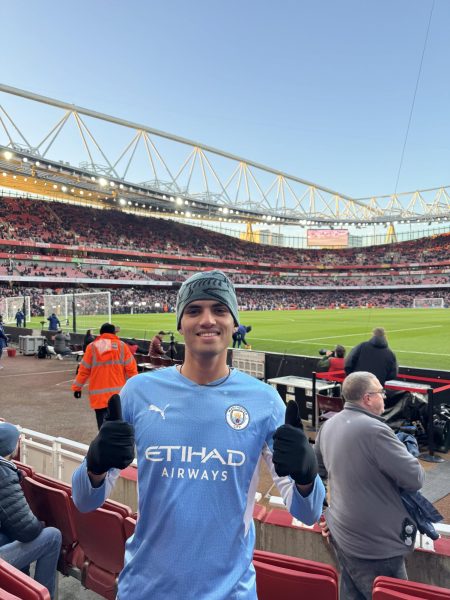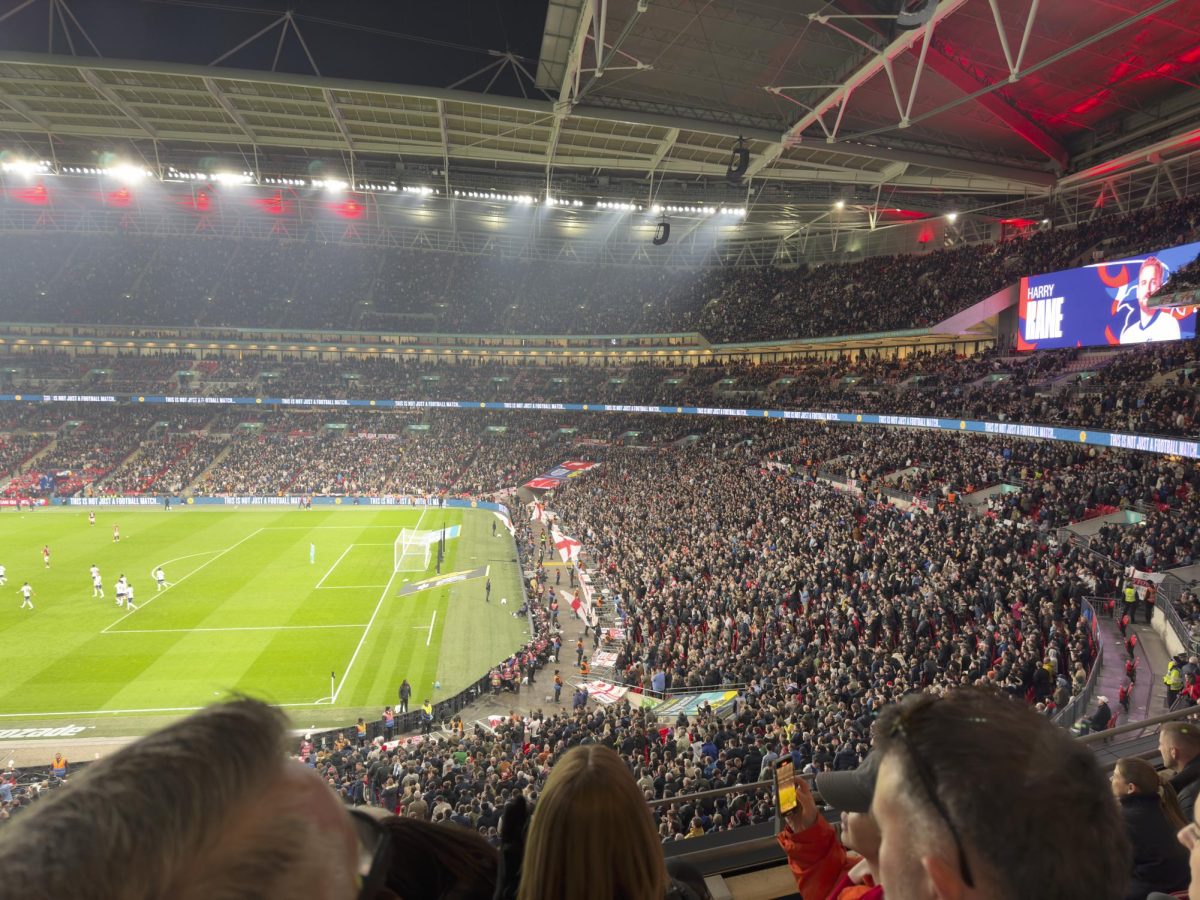On the evening of March 24, my family, two friends and I rode the Metropolitan line of the London Underground six stops from Farringdon to Wembley Park. It was the World Cup Qualifiers and England was set to face Latvia.
On the train, we found whatever spare seats we could, separated by a mix of after-work commuters and football fans. As the train sped through the dim tunnels of the Underground, waves of men in red and white England scarves and jerseys boarded at each stop, gradually filling the aisle that separated me and my family seated opposite. We could no longer exchange knowing looks of amusement or concern in reaction to the thick northern accents and obvious drunken sways.
Kickoff was 7:45. We heard the famous phrase “mind the gap” and stepped off the tube at Wembley Park Station. The stadium’s iconic arch glowed red and white ahead of us, sending chills down my spine. I led our group towards the designated entrance on our tickets, Gate B. Every few steps, I looked over my shoulder to ensure no one got swept away in the crowd. The trek down Olympic Way, the one-kilometer stretch between the tube and the stadium, proved tame and lacked flying beer cans. I said a silent thanks.
I was prepared for utter chaos. I had seen the clips on social media of the disorderly antics and unwavering passion of English football.
As we approached the security checkpoint, I was reminded that the game had already begun after glancing at the start time on my ticket. It was then seven minutes past kickoff, but other than the sea of fans still marching down Olympic Way in English red and white, there was no indication of a match on the other side of the stadium walls.
“Why can’t I hear anything?” I said to my mother before scanning my ticket and walking through the double doors.
I was prepared for utter chaos. I had seen the clips on social media of the disorderly antics and unwavering passion of English football. I understood that the crowd would be pint-fueled and white-knuckled. I had seen the Netflix documentary titled “The Final: Attack on Wembley,” in which ticketless England fans stormed Wembley for the Union of European Football Associations (UEFA) Euro 2020 final after vandalizing and destroying Olympic Way in a drunken, drug-induced haze.
Instead, it was eerily calm.
A hum of conversation filled the space as if the match was background entertainment and the 90,000 people were there to chat among themselves.
A fellow study abroad student, Katie Brosky, Fordham College at Lincoln Center (FCLC) ’26, was at the same game. She was accompanied by her parents, who were visiting London for the first time from her hometown of Philadelphia, Pennsylvania.
“We met this guy on the tube on the way there,” Brosky said. “He heard that we were American and came over to us and was like, ‘Are you guys ready for a proper football game?’”
But the Brosky family’s benchmark was set by the National Football League (NFL).
“I went to an Eagles game this past December, and the reactions after we got a touchdown, or even a minor point, were times 100 of the reactions of England’s crowd,” she said. “I feel like you’re barely ever sitting down at an Eagles game.”
Upon entering the stadium, no one was on their feet, which we later realized was partly because of the “ground regulations” published by Wembley National Stadium Limited. The policy was put in place in 1994 to ensure the safety of football fans following the Hillsborough disaster in 1989, when 97 Liverpool fans died because of overcrowding in standing areas of the arena.
“Unless in a designated safe standing area, nobody may stand in any seating area whilst play is in progress. Persistent standing in seated areas during an Event is strictly forbidden and may result in ejection from the Ground,” ground regulation 11 states.
A hum of conversation filled the space as if the match was background entertainment and the 90,000 people were there to chat among themselves. Brosky described the lack of noise from the English crowd as deafening.
“The section in front of me was Latvia fans,” Brosky said. “I feel like they were more excited to be there than anyone else. They were the ones that I saw jumping up and down and doing a kind of Latvia chant, and they didn’t even score.”
Thirty-eight minutes into the 94-minute match, Defender Reece James scored a goal to put the first point on the board. The crowd erupted in cheers, followed by a brief “Go, England, Go!” chant. The excitement subsided after about 20 seconds of celebrations, and everyone was directed by the steward in their section to sit down.
Swaths of people, including my two friends and I, stepped out into the concourse area to down a pint, knowing another goal likely wouldn’t follow before halftime at the 45-minute mark. Brosky and her family followed suit. Drinking is prohibited in the seating area. Pints of beer must be finished only at the bar area where they are sold.
“My parents were actually quite shocked about that, and pretty disappointed,” Brosky said.
Queues quickly formed at each stand, and the surrounding area began to look like a pub, filling with men there to watch the final moments of the first half on the television screens with a pint of beer in hand.
“Football means a great deal to me because obviously, I love when we win, I hate when we lose, but it’s also about the connections you make with your community and how you identify yourself.” Charlie Binns, FCLC ’25
The Brosky family spent halftime chatting with die-hard football fans fascinated by their American accents. They exchanged American and British quirks and the Broskys got a taste of Premier League soccer tribalism.
There are 20 Premier League soccer teams in England, seven of which are London-based. Fans often align with the team from where they grew up and the players are often seen as hometown heroes. The top 17 teams from the previous season and the three top teams from the lower championship league make up the following year’s league.
“I remember these guys. We actually still refer to them in my family as the ‘Ipswich guys’ because they were like, ‘Ipswich is the team to root for,’” Brosky said. “We met a lot of different people who were all convinced that their team was the right team.”
Hadar Shoval, Gabelli School of Business at Rose Hill ’26, is a loyal Manchester City fan and has been to four of their games, only one of which was during his semester abroad.
“There’s still fans that will be lifelong fans for these teams that never really make it big, but for those small moments, those mean more to them,” he said. “It’s a more romantic following.”

For the 2024-2025 season, Ipswich Town was promoted to the Premier League after a 22-year absence.
Charlie Binns, FCLC ’25, is an international student from London studying at Fordham Lincoln Center. From Highbury in North London, Binns is a lifelong Arsenal fan, the second-ranked team in the Premier League championship this year.
“Football means a great deal to me because obviously, I love when we win; I hate when we lose. But it’s also about the connections you make with your community and how you identify yourself,” he said.
Binns has also been to his share of American sports games.
“It’s a different level of passion. And that’s not to say that American sports fans don’t have passion, it’s just expressed in different ways. It’s a little bit more subdued,” he said. “Like sports are important, but it’s not life or death.”
Within the last decade, the England national team has been a top competitor internationally with one of its strongest rosters ever.
While Premier League football ignites personal and rivalrous passion from its fan bases, England’s national football team unites them.
Within the last decade, the England national team has been a top competitor internationally with one of its strongest rosters ever. In 2021, the team made it to a final for the first time since 1966, where they won their first and only major title at the World Cup. England lost to Italy at the COVID-19-postponed 2020 UEFA Euro final at Wembley Stadium, and in 2024, were runners-up again after a loss to Spain in the European final.
Because of England’s competitive record, the result against Latvia was never really in question.
In the second half, striker and national league veteran Harry Kane scored a goal for England at the 68-minute mark and midfielder Eberechi Eze at the 76-minute mark. On both occasions, there was a rush of excitement that followed. Quickly thereafter, the crowd settled back into a casual buzz.
“You feel a little on your own with soccer games. The game, there is a halftime break, but it’s constantly flowing. And you do have to bank on something good happening in order to have that moment of jubilation, like going crazy in the stands,” Shoval said.
My family and I left shortly after Eze’s goal, which set the final score at 3-0. We had every intention of beating the crowds with an early departure. However, the entire stadium seemed to think the same. The walking traffic back up Olympic Way to the tube station was packed toe to heel and slow-moving. Security personnel worked crowd control at the bottom steps before the station entrance. Every so often, they halted the crowd to allow the platform above to clear, then allowed the throngs of fans to continue upwards before the next tube arrived.
There were no riots or storming of the stadium. It was no “Attack on Wembley.” As the train approached the station, a little boy sat atop his father’s shoulders and chanted, “Go, England, go!”
“American sports culture is a lot more about entertainment. It’s more about increasing the amount of consumption that fans get. You get halftime shows, national anthems before everything, performances,” Binns said.
Two 45-minute halves of nonstop gameplay paired with a mostly-still audience felt foreign and subdued. But to an English fan, it typified passion and tradition.


